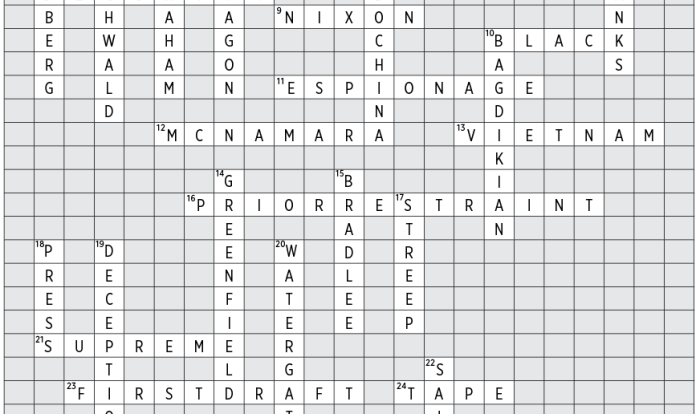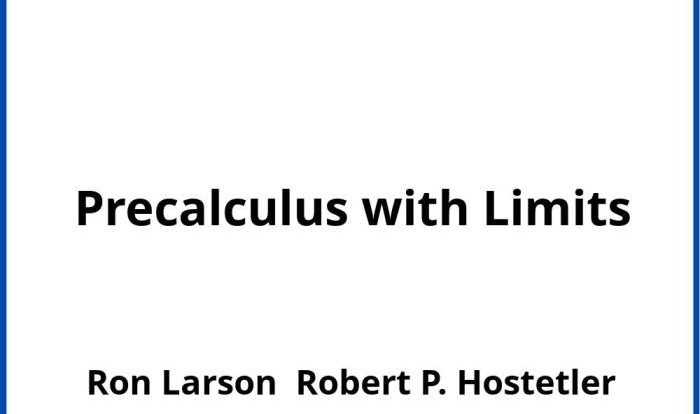Literacy behind bars malcolm x – Embarking on a journey into the captivating world of literacy behind bars, we delve into the transformative power of Malcolm X’s unwavering advocacy for education and empowerment. Join us as we explore the profound impact of his legacy on social justice and the ongoing pursuit of literacy.
Malcolm X’s childhood experiences ignited within him a deep-seated thirst for knowledge. Immersed in the written word from an early age, he recognized the transformative potential of literacy, a beacon of hope in the face of adversity.
Malcolm X’s Early Life and Education
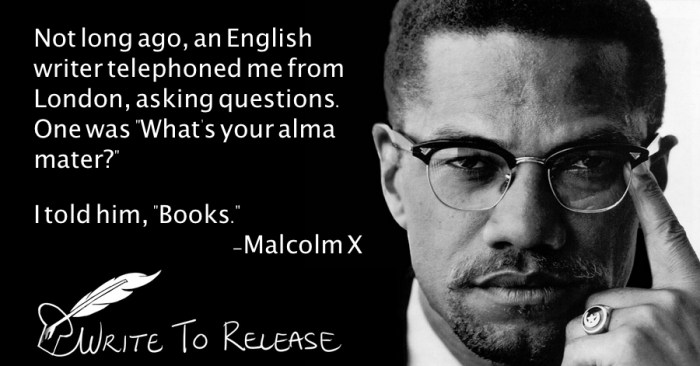
Malcolm X’s early life experiences played a significant role in shaping his views on literacy. Born Malcolm Little in 1925, he faced poverty, racism, and violence from a young age. His father, a Baptist minister, was murdered by white supremacists when Malcolm was six, and his mother was institutionalized due to mental illness when he was thirteen.
Despite these challenges, Malcolm X developed a deep appreciation for education and literacy. He found solace in books, which provided him with a sense of escape and a way to make sense of his world. As a child, he was drawn to the works of authors such as Richard Wright and W.E.B.
Du Bois, whose writings resonated with his own experiences of racism and oppression.
Early Exposure to Literature
Malcolm X’s early exposure to literature had a profound impact on his development. He became an avid reader, spending countless hours in the library and reading everything he could get his hands on. Through his reading, he gained a deep understanding of history, philosophy, and social justice issues.
This knowledge became a powerful tool in his fight against racism and oppression.
The Importance of Literacy in Prison
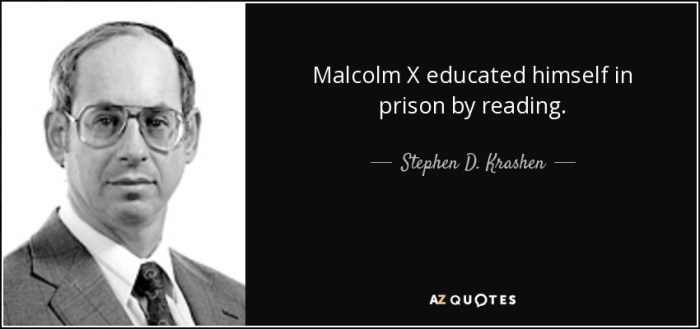
Within the confines of prison, literacy emerged as a transformative force for Malcolm X and countless other inmates. It unlocked a gateway to knowledge, self-discovery, and personal growth, ultimately shaping their lives beyond the prison walls.
Literacy as a Catalyst for Transformation
For Malcolm X, literacy became an instrument of liberation. As he immersed himself in books, his worldview expanded, and his understanding of history, politics, and social justice deepened. The written word ignited a fire within him, fueling his desire for self-improvement and inspiring him to challenge the oppressive systems that had incarcerated him.
Access to Education and Empowerment
Access to books and education in prison empowered Malcolm X and his fellow inmates. It provided them with the tools to critically analyze their experiences, develop their intellect, and envision a better future. Through education, they gained the knowledge and skills necessary to advocate for their rights, resist oppression, and break the cycle of incarceration.
Malcolm X’s Literacy Advocacy
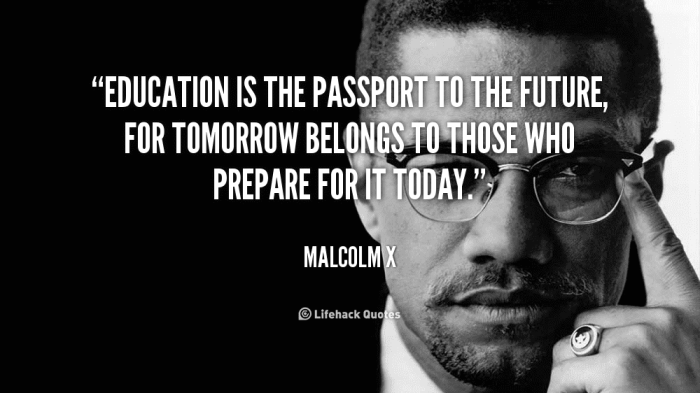
Malcolm X was a passionate advocate for literacy among marginalized communities. He believed that education was the key to empowering people and breaking down barriers of inequality.Malcolm X often spoke and wrote about the importance of education. In a 1963 speech, he said, “Education is the passport to the future, for tomorrow belongs to those who prepare for it today.”
He also wrote in his autobiography that “reading was the only way to educate myself.”
Malcolm X’s Efforts to Promote Literacy
Malcolm X established schools and learning centers in various communities. He organized classes, provided books and materials, and encouraged people to pursue their education. One of his most notable efforts was the founding of the Muslim Mosque, Inc. (MMI) in Harlem, New York.
MMI offered a wide range of educational programs, including literacy classes, tutoring, and vocational training.Malcolm X also worked to raise awareness about the importance of literacy. He gave speeches, wrote articles, and participated in public debates to emphasize the transformative power of education.
He argued that literacy was not only a personal benefit but also a social responsibility. By promoting literacy, Malcolm X sought to create a more just and equitable society.
Literacy as a Tool for Empowerment: Literacy Behind Bars Malcolm X
Literacy empowers individuals and communities by unlocking a world of knowledge, opportunities, and self-expression. It breaks down barriers, creating a path toward personal growth, social mobility, and societal transformation.
Breaking Down Barriers, Literacy behind bars malcolm x
Literacy challenges systemic inequalities and prejudices by providing individuals with the skills and confidence to navigate complex systems, advocate for themselves, and hold institutions accountable. It empowers marginalized groups to participate fully in society, breaking down social and economic barriers.
Malcolm X’s journey to literacy behind bars is a testament to the transformative power of education. His experience resonated with countless others who found solace and empowerment in the written word. In a similar vein, the puff fall loach ick can winks is a testament to the resilience and adaptability of the human spirit.
It reminds us that even in the most challenging circumstances, literacy can be a beacon of hope and a catalyst for change.
Creating Opportunities
Literacy opens doors to education, employment, and personal fulfillment. It allows individuals to acquire new skills, access information, and communicate effectively. By expanding their knowledge and abilities, literacy creates opportunities for economic advancement, career growth, and personal empowerment.
The Legacy of Malcolm X’s Literacy Advocacy
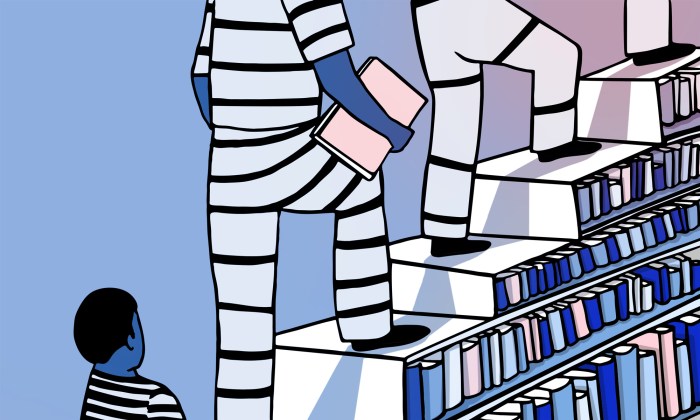
Malcolm X’s unwavering commitment to literacy left an indelible mark on education and social justice movements worldwide. His belief that education was the key to unlocking the potential of marginalized communities resonated with activists and educators alike, inspiring countless initiatives to promote literacy and empower individuals.
Malcolm X’s ideas continue to motivate efforts to combat illiteracy and promote social equity. His advocacy for literacy as a tool for self-determination and liberation has inspired organizations dedicated to providing access to education and resources for underprivileged communities. These organizations, guided by Malcolm X’s legacy, strive to break down barriers to literacy and empower individuals to achieve their full potential.
Malcolm X’s Influence on Prison Education
Malcolm X’s experiences in prison profoundly shaped his views on the importance of literacy. While incarcerated, he dedicated himself to self-education, reading voraciously and expanding his knowledge. His transformation through literacy became a model for others, inspiring prison education programs that provide inmates with opportunities to learn and grow.
Malcolm X’s Impact on Social Justice Movements
Malcolm X’s advocacy for literacy extended beyond prison walls. He recognized that literacy was a fundamental tool for social change, empowering individuals to understand their rights, advocate for justice, and participate fully in society. His teachings inspired countless activists to prioritize literacy as a means of empowering marginalized communities and fighting for social equality.
Essential Questionnaire
What was the significance of Malcolm X’s literacy advocacy?
Malcolm X recognized literacy as a fundamental tool for empowerment, enabling individuals to break down barriers, gain knowledge, and actively participate in society.
How did Malcolm X promote literacy among marginalized communities?
Malcolm X established schools and educational programs, encouraged reading and writing, and emphasized the importance of education as a path to self-sufficiency and social change.
What is the legacy of Malcolm X’s literacy advocacy?
Malcolm X’s unwavering commitment to literacy continues to inspire efforts to promote education and social justice, empowering individuals and communities to achieve their full potential.
